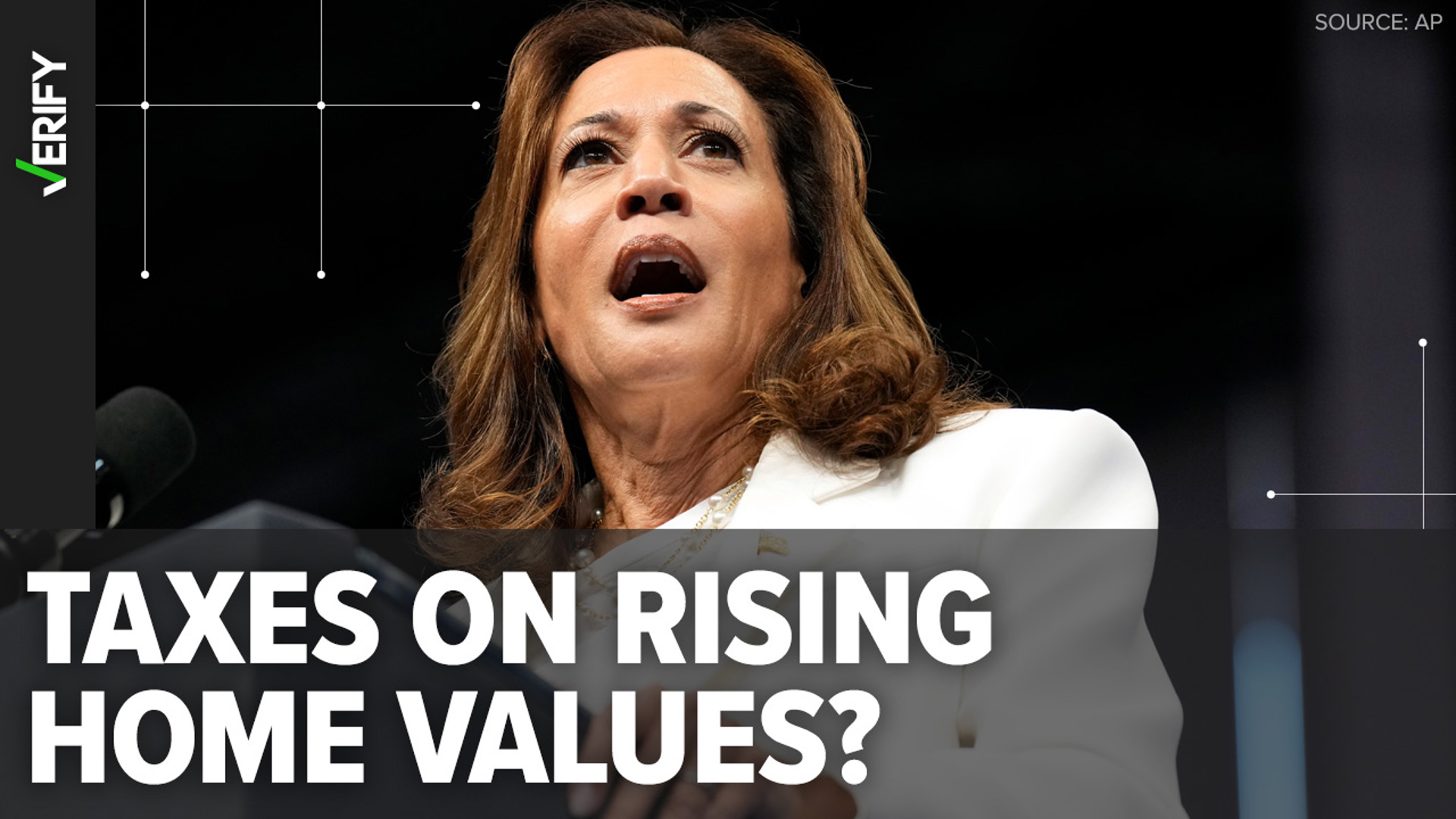Following her nomination at the Democratic National Convention, Vice President Kamala Harris has been facing questions about what her economic policies will be if she wins the 2024 presidential election.
Harris said she supports the policies recently proposed by President Joe Biden in his 2025 fiscal year budget.
One of those policies includes a tax on something called “unrealized gains.” Some posts online claim that means if the value of their home goes up, Americans would have to pay taxes on that increase, even if they don’t sell the home.
Numerous VERIFY readers emailed and texted us to ask if that’s true.
THE QUESTION
Does the Biden-Harris unrealized gains tax proposal mean most Americans would have to pay a tax if the value of their home increases?
THE SOURCES
White House budget proposal for the 2025 fiscal year
USA Wealth Report, Henley & Partners
THE ANSWER
No, the Biden-Harris unrealized gains tax proposal does not mean most Americans would have to pay taxes on an increase in home value even if they don’t sell. The proposed tax would apply only to people with net worths of at least $100 million.
WHAT WE FOUND
“Unrealized gains” are the theoretical profit a person would make on an asset like a house or stock before that asset has been sold. In other words, it’s the increase in the asset’s value since that person acquired it.
President Biden, in his latest budget proposal, suggests taxing such gains, arguing it would create a more equitable tax code.
“While the wages and salaries that everyday Americans earn are taxed as ordinary income, billionaires make their money in ways that are taxed at lower rates, and sometimes not taxed at all,” the proposal reads.
However, this proposal would only apply to those with a net worth “of more than $100 million.” The White House says that constitutes just “the wealthiest 0.01 percent” of Americans. By one estimate that means the tax would only apply to 9,850 people in the entire country.
How unrealized gains taxes work
Let’s say you purchased an asset – for this example, a share of stock – for $10. If the value of that stock increases to $15 and you sell the share, you have to pay taxes on the $5 profit you just made. This is called a capital gains tax. (Note: Depending on a person’s overall tax bracket and how long they hold the stock, some people may not have to pay capital gains taxes.)
But if you don’t sell your share of stock, even though you’ve technically gotten $5 richer, you don’t have to pay taxes on the newfound wealth – your unrealized gain – yet.
If you were subject to an unrealized gains tax, you would have to pay taxes on the $5, even if you don’t sell the stock.
Biden-Harris unrealized gains tax proposal
Under Biden’s proposal, if you do eventually sell the stock for profit and pay your capital gains taxes, the unrealized gains taxes you’ve already paid are deducted from what you owe. In other words, the government wouldn’t double-dip and tax the same gains twice.
Biden has proposed to use such a tax to make it so the ultra-rich pay taxes at a rate of 25 percent of their total increase in wealth – the sum total of their ordinary income and the increased value of their assets. The White House refers to this as a “minimum tax on billionaires” because it would assure that even in years where a very wealthy person didn’t take in any ordinary income, they pay taxes at a consistent rate.
To facilitate such a tax, people in the applicable bracket would have to report the value of their assets to the IRS each year. Details published by the Treasury Department state that when the price of an asset isn’t easily determinable the way it is for stocks, wealthy taxpayers could use various formulas to estimate its worth and would not have to get annual appraisals.
The Treasury Department also says the IRS would provide flexibility to those whose assets are illiquid – meaning not easily sold for cash – in order to avoid anyone having to give the government more money than they actually have on hand.
CORRECTION: A previous version of this story misstated the proposed tax rate as 25 percent of total wealth. The story has been updated to clarify the tax would apply only to the total increase in wealth.
This story is also available in Spanish / Lee este artículo también en español: Impuesto a las ganancias no realizadas de Biden-Harris no afectará a la mayoría de los estadounidenses

